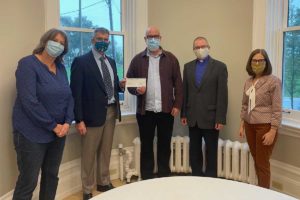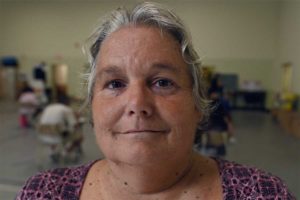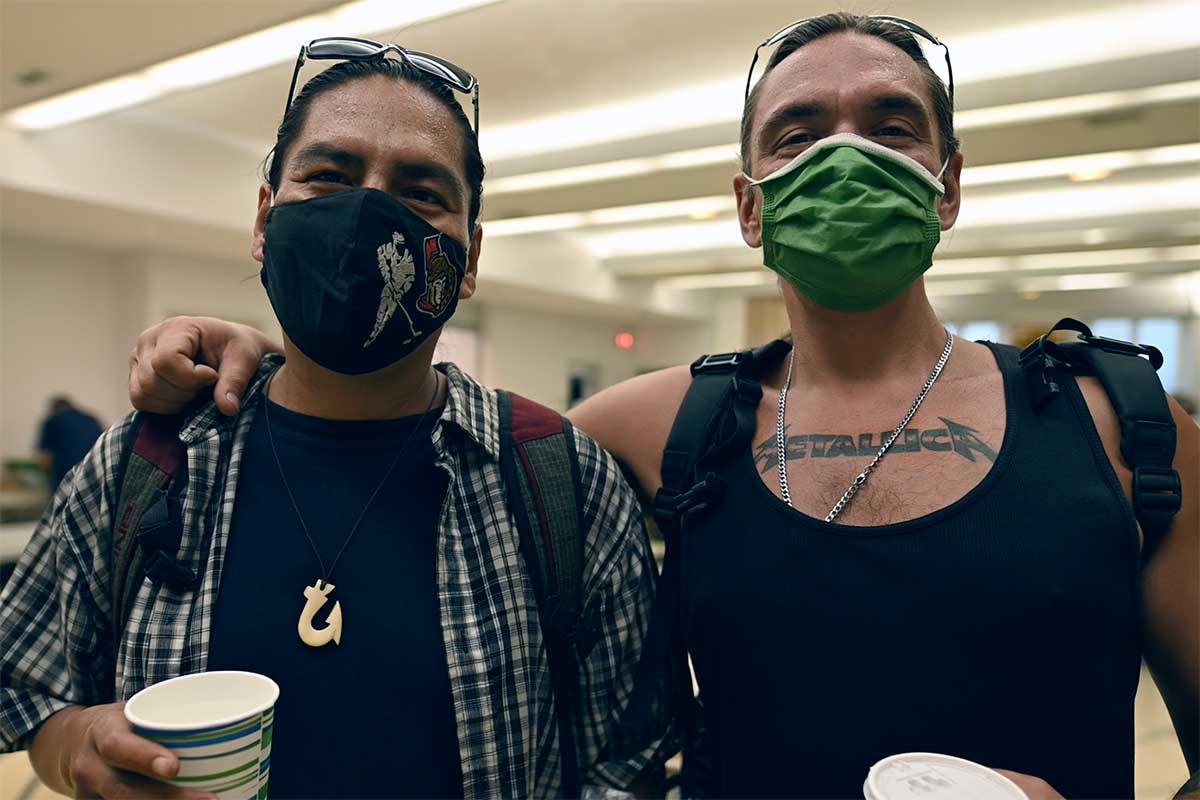The second annual Building a Community of Hope fundraiser and silent auction, which took place online on Oct. 21, was an even bigger success than last year’s event. Although the final total was not available at press time, Jane Scanlon, director of communications and stewardship, said that the amount raised had significantly surpassed the $79,000 raised at the 2020 event to support the Anglican Diocese of Ottawa’s partner community ministries.
The Anglican Diocese of Ottawa hosted a livestreamed virtual tour of the community ministries, giving the online audience of more than 300 people a chance to see and hear how these seven agencies—Centre 105, Centre 454, Cornerstone Housing for Women, Ottawa Pastoral Counselling Centre, Refugee Ministry, St. Luke’s Table, and the Well, serve vulnerable people throughout the diocese.
Ottawa mayor Jim Watson welcomed viewers to the event and congratulated the Anglican Diocese of Ottawa on its 125th anniversary and the success of its campaign to build 125 units of affordable housing to mark the anniversary.
Host Kathie Donovan asked the Rev. Dr. Canon Peter John Hobbs, the director general of community ministries for the Diocese, how the pandemic had affected the community ministries.
“One of the things the pandemic has done is that it has brought into sharper focus the needs of those who are struggling around issues of poverty, homelessness, issues around addiction and mental health… the pandemic heightened our awareness. … At the same time, it has exacerbated those problems,” he said.
The pandemic has also “shown the adaptability of the community ministries to address needs in the face of a crisis,” Hobbs said. “The Ottawa Pastoral Counselling Centre has gone completely virtual. Our day programs have been able to expand their hours. We’re doing more street outreach.”

Day programs
Rachel Robinson, executive director of the Ottawa Anglican Day programs, told viewers that the three programs in Ottawa that she oversees —St. Luke’s Table, The Well, and Centre 454— all provide for basic needs, but “we also help people access mental and physical health supports and also navigate the social assistance system,” she said.
“Sadly, we are seeing more and more people who are sleeping rough, who are unsheltered. During the pandemic, many people were scared to access the shelter system,” Robinson said.
The Well is located in the basement of St. John the Evangelist on Elgin Street in Ottawa. “Pre-COVID, it was a program for women and women with children. As a response to the pandemic, we’ve actually opened it up so that all people can access laundry and the showers and the washrooms,” said Robinson.
Bob Nesbitt told viewers that he goes to Centre 454, “for coffee, snacks and for help from the counsellors if I have a problem….The counsellors are very good here. They’ve seen it all and done it all twice, so they know how to help the poor.”
Cornerstone Housing for Women
Sarah Davis, executive director of Cornerstone Housing for Women, told viewers that 38 years ago, Cornerstone began with three cots in the basement of a church. “Today, we serve 230 women each and every night in our four supportive housing facilities, in our emergency shelter and our outreach program…
“Each of our housing residences offers something unique to meet the needs of vulnerable women in Ottawa. Our Booth street location includes our aging at home program, providing permanent housing with wrap-around health care, mental health and meal supports. Our Princeton residence offers Indigenous and cultural services as 40 percent of our population here are Indigenous. Our MacLaren House provides more independent living supports that are uniquely tailored to each woman to help them find work, housing, and social supports,” she explained.
“In the last year, Cornerstone Housing for Women doubled its capacity — from serving 61 women to 125 women in our emergency shelter program in merely four months.”
Donovan interviewed Ottawa city councillor Catherine McKenney as a long-time supporter of the ministries’ work. “We often think that people who have been outside for a long time or in shelter for a long time are unable to be housed, but they can. Anybody can be housed with the right supports around them,” she said. “Cornerstone has shown that.”

Centre 105
Centre 105 is a newer ministry that serves vulnerable people in Cornwall, Ont. Program co-ordinator Taylor Seguin has overseen its rapid growth during the pandemic. The Centre still serves breakfasts three days a week as it did in the beginning, but now it also offers some laundry services, pastoral counselling, and referrals to other agencies.
“We now have to offer our breakfast as a takeout meal, so there are all sorts of other costs associated with putting these meals together not to mention the growing number of participants we have,” said Seguin. “We’re seeing about 100 participants a day now and we’re open three days a week, so around a thousand or 1,200 a month. This is new to us, very new territory to be hitting triple digits every day, so we’re also seeing our food costs go through the roof, [and] we continue to serve more and more people.”
But Centre 105 has fans. Phyllis Collins was interviewed for the virtual tour. “I come to the Centre 105 Breakfast Club. Here we meet people, we become friends, we’re like a family,” she said. “The people who work here are friendly and kind. If we need help with anything, they are there to help us…. I love coming here.”
Ottawa Pastoral Counselling Centre
The Ottawa Pastoral Counselling Centre (OPC) has been offering counselling and psychotherapy services to the diocese and the larger community for over 50 years on a fee for service basis.
But “about seven years ago, the OPC had a dream,” executive director Sharon York told viewers. The dream was to create a trust fund for the Counselling Support Fund. “The goal of this fund was to allow other people to donate financial resources for counselling for those in our community who could not afford to access counselling services,” York explained.
“I don’t know if I can describe for you how important it is and what joy it brings me when someone phones, and I know they’ve called three or four other places …. and they say ‘I don’t have any money or I have very little resources but I really need the help,’ And I am able to say because of the Counselling Support Fund, “It’s okay, we’ve got this.” In the last 18 months, through the pandemic, we have used that fund over and over and over again,” York said.
“The amount of people accessing our services because of the pandemic has quadrupled. The people asking for counselling support and needing financial resources has also doubled….
“And in the midst of this pandemic, we changed. We went from an agency that was 95% face-to-face counselling to 100% virtual, telephone and video conferencing.
“At the time I wasn’t sure how it would work. How am I going to move from sitting in a room, close and intimate with somebody, hearing their story, supporting them, to working with them in front of a computer screen? And yet,…it does work. I remember working with somebody who was talking about a death in her family. In the midst of our session, she reached out and she touched her screen, and I realized that she was actually touching my face through the screen. I thought, ‘Wow, I guess compassion, support, love passes right through a computer screen.’
An interesting byproduct of this visual and this computer-based psychotherapy is that suddenly we are reaching so many more people, people living up in Renfrew or Deep River or in Shawville.”
Refugee ministry
The diocesan refugee ministry is also supported as a community ministry. Since 2015, parishes and families has welcomed 697 refugees to the diocese.
Nadia Alafashi is originally from Yemen. Although she has been in Canada for nearly 20 years, she told the virtual tour viewers that she was searching for four years to find someone to help guide her through the process of sponsoring her family.
“ I literally lost hope until I found the Refugee Now and the Diocese, and they were able to help me sponsor my family and the process only took a year and a half. It’s been almost 8 months since my family arrived in Ottawa and they are very happy. It was very quick and smooth.….It’s a new hope that Canada has given them again. First and foremost, I thank God and then the Diocese who helped me sponsor my family.”


Saint Mary’s Church, Westmeath — Deanery of the Northwest